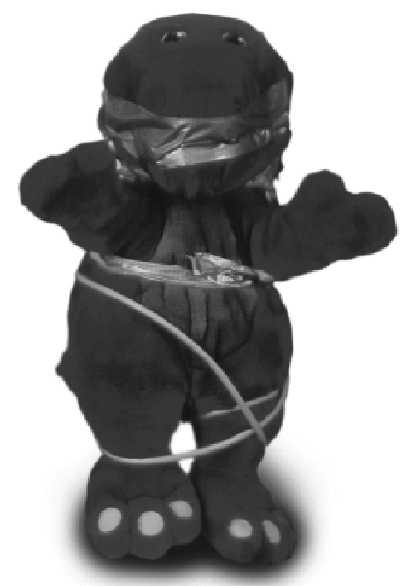Alien Autopsy
"Hi there, it's so nice to see you" said the plump Purple dinosaur as I squeezed his left hand. "Squeeze my hand to play a game, squeeze my foot to sing a song, cover my eyes to play peek-a-boo" it continued, needlessly waving its hands and head from side to side. I saw how adults (the majority purchasers of toys) immediately connected with the underlying logic of the machine - computers are simple and untiringly repetitive, and so are kids; why not get the one to look after the other?
 I have always had an interest in what is generally dubbed 'pervasive computing', in which computers leave their beige boxes and emerge in everyday objects - phones, hoovers, washing machines (and now children). Why should a computer be hard? Hard to use and hard to touch? I like the idea of a computer which has some awareness of its external environment. I like the idea of a computer being held tightly at night, ready to ask, "Did you have a bad dream?" I also like the idea of a computer I can drop, something I can do with my new Microsoft toy, 'Barney' (unlike with my laptop). When I pick Barney up and cover his eyes he says, "Ohh, it sure is dark in here". When I remove my hand and light streams in, his response changes immediately.
I have always had an interest in what is generally dubbed 'pervasive computing', in which computers leave their beige boxes and emerge in everyday objects - phones, hoovers, washing machines (and now children). Why should a computer be hard? Hard to use and hard to touch? I like the idea of a computer which has some awareness of its external environment. I like the idea of a computer being held tightly at night, ready to ask, "Did you have a bad dream?" I also like the idea of a computer I can drop, something I can do with my new Microsoft toy, 'Barney' (unlike with my laptop). When I pick Barney up and cover his eyes he says, "Ohh, it sure is dark in here". When I remove my hand and light streams in, his response changes immediately.
By inhabiting toys, the 'digital' has found a new way to interact with people. In toys, the soft machine comes ever closer, and with it a host of new design issues. Instead of the graphic user interface, we now have emotional interfaces, connecting directly with the user/player's psychological state.
Ultimately though, Barney manifests little of the soft machine's potential. Instead, imagine a purple cushion with the voice of a Sesame Street Stephen Hawkings singing nursery rhymes in which the words have been changed, simplified or rewritten by Microsoft. With Barney "Round and round the mulberry bush" becomes "The wheels of the bus go round and round" - presumably the Microserfs have never even seen a mulberry bush, let alone enjoy a song about one. They've updated "This old man, he played two, he played 'nick-nack' on my shoe, with a nick-nack paddy-wack, give a dog a bone, this old man went rolling home," to "I love you, you love me, we're a happy family."
How strange it must be to want to remove the darker side of children's nursery rhymes in the service of such 'PC' Barney-values as 'Fruit is good for you' and 'Exercise keeps you fit'. Barney's potential has effectively been sanitised out of existence. One can't help thinking he now expresses the narrow opinions of a small group of Californian parents sitting in some focus group somewhere, whereas he could offer the exact opposite - an opportunity to reverse this whole cultural trend. By being controllable, even programmable by them, Barney could have empowered parents to pass on their own values, rather than being yet another vehicle through which to circumvent 'local' culture. Alternatively, his creators could have avoided this by leaving language out altogether.
While Barney can receive local radio transmissions, in the final analysis this merely makes him a victim, or puppet - either of the 'interactive CD-Rom' or of special signals carried on video cassettes (and perhaps one day those of a TV channel). In fact, the idea seems to be for Barney to assist your child in watching television.
So, is Barney interactive? I guess this depends on how far you can round down your definition of 'interactive'. Given children's capacity to make even the most inanimate household objects into spaceships and aeroplanes, perhaps Barney and Microsoft have missed the interactive point.Sheep T. Iconoclast Xsheep AT bartlett.ucl.ac.ukX
Mute Books Orders
For Mute Books distribution contact Anagram Books
contact@anagrambooks.com
For online purchases visit anagrambooks.com







